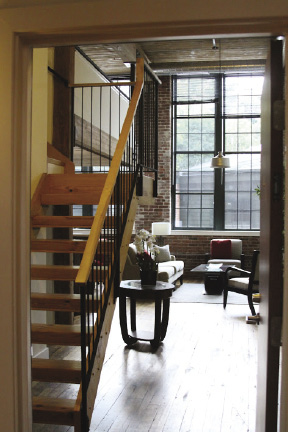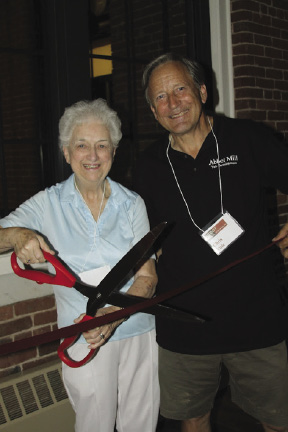Tocci Building Cos. said that the main building of the Abbot Mill renovation in Forge Village is substantially complete. Originally built in 1870 and now owned by Yule Development, the 239,000 s/f project is part of the history of industrial Massachusetts. The residential complex includes a main mill and five out buildings totaling 131 units, 13 of which are affordable housing. The project team recently celebrated its grand opening.
The renovated main building with its signature bell tower marks the rejuvenation of Forge Village. Once a busy fabric mill, Abbot "Worsted" changed hands several times throughout the last 50 years and eventually fell into disrepair. Together with Yule Development, Tocci restored this important landmark and transformed it into living spaces reflecting the mill's rich past while adhering to current sustainable building practices.
Many features of the original Victorian building were either restored or replicated. For example, boarded-up saw-tooth skylights, originally constructed to draw natural light into interior spaces for mill workers, once again allow light to flood common areas and apartment units.
The owner of Yule Development, Chris Yule, initiated several changes to increase sustainability throughout the project. Solutions were found to dramatically limit heat and cooling loss, including sealing and insulating each unit. Whenever possible, materials were re-used on-site rather than thrown away. Lumber off-cuts were used as the stairs risers. Steel plates that once reinforced the mill floor were transformed into unit signs.
A primary sustainable feature is 40,000 s/f of solar panels on the roof, producing 331KW of non-carbon energy. The renovation kept heat exchangers in place, continuing to use canal water for heating and cooling. In his green endeavors, Yule hopes to restore the original hydroelectric generator beneath the building to produce electricity.
The rich mill history includes several owners: Abbot Worsted Mills was sold to Murray Printing and then to Courier Printing. When their needs changed, owners built additions based on function with little regard for architectural integrity. During renovations, Tocci encountered numerous challenges posed by the sheer variety of these additions: brick, timber and concrete construction, varying floor levels, and confined spaces.
"Tocci's historical renovation and construction expertise have been fundamental to this project," said Chris Yule. "My main objective was to preserve the historical context of the building while creating an energy efficient, modern living environment that complements today's aesthetics. Tocci's flexibility and advanced array of services have been instrumental in achieving that goal."
In addition to the superintendent, Tocci put an assistant superintendent on-site to support construction management and use virtual design and construction (VDC). His dual role led a pilot program of atomization, furthering Tocci's BIM technology. At its core, atomization takes people out of the office and embeds them in a construction site to use 3D tools every day and involve the trades. At Abbot Mill, while a lot of the construction coordination was done manually, much of the mechanical coordination was done with 3D modeling.
Renovation activities were filmed during construction, and a video is available on youtube. To learn more about the mill, please visit Yule Development. In addition to Tocci, the project team included Barry Ganek Architects, Sousa & True Structural Engineers, MacRostie Historic Advisors, and HW Moore Associates, site engineers.
The grand opening ribbon was cut by Helena Crocker and Chris Yule, owner of Yule Development. Crocker grew up in Forge Village, once worked in the mills, and is currently chairman of the Council on Aging.
Tags:
Tocci Building Cos. substantially completes historical renovation at Abbot Mill in Forge Village for Yule Development: project team includes: Barry Ganek Archts., Sousa & True, and MacRostie Historic Advisors
September 20, 2012 - Construction Design & Engineering










.png)